Deutsche Bank Leadership Interview and Analysis Report
VerifiedAdded on 2022/10/18
|12
|2542
|240
Report
AI Summary
This report presents a detailed analysis of an interview conducted with Raman Grover, Director at Deutsche Bank Operations International, focusing on his perspectives on leadership in the global marketplace. The interview explores various aspects of leadership, including the challenges posed by a diverse and culturally nuanced workforce, and the importance of skills such as strong human relations, diversity skills, and effective communication. Grover discusses his approach to leading globally, emphasizing the constructive-developmental approach and highlighting leadership role models like Steve Jobs and Mark Zuckerberg. The interview delves into effective and ineffective leadership approaches, with the traits and functional approaches being effective, and the servant leadership approach being ineffective in his view. Grover also explains how he determines which leadership approach to use based on the situation, and shares rewarding and difficult experiences as a leader, including how he manages performance management and adapts his approach over time. The interview concludes with advice for future leaders in a global context, emphasizing flexibility and technological proficiency.

Leadership in business
1 0 / 1 9 / 2 0 1 9
1 0 / 1 9 / 2 0 1 9
Paraphrase This Document
Need a fresh take? Get an instant paraphrase of this document with our AI Paraphraser
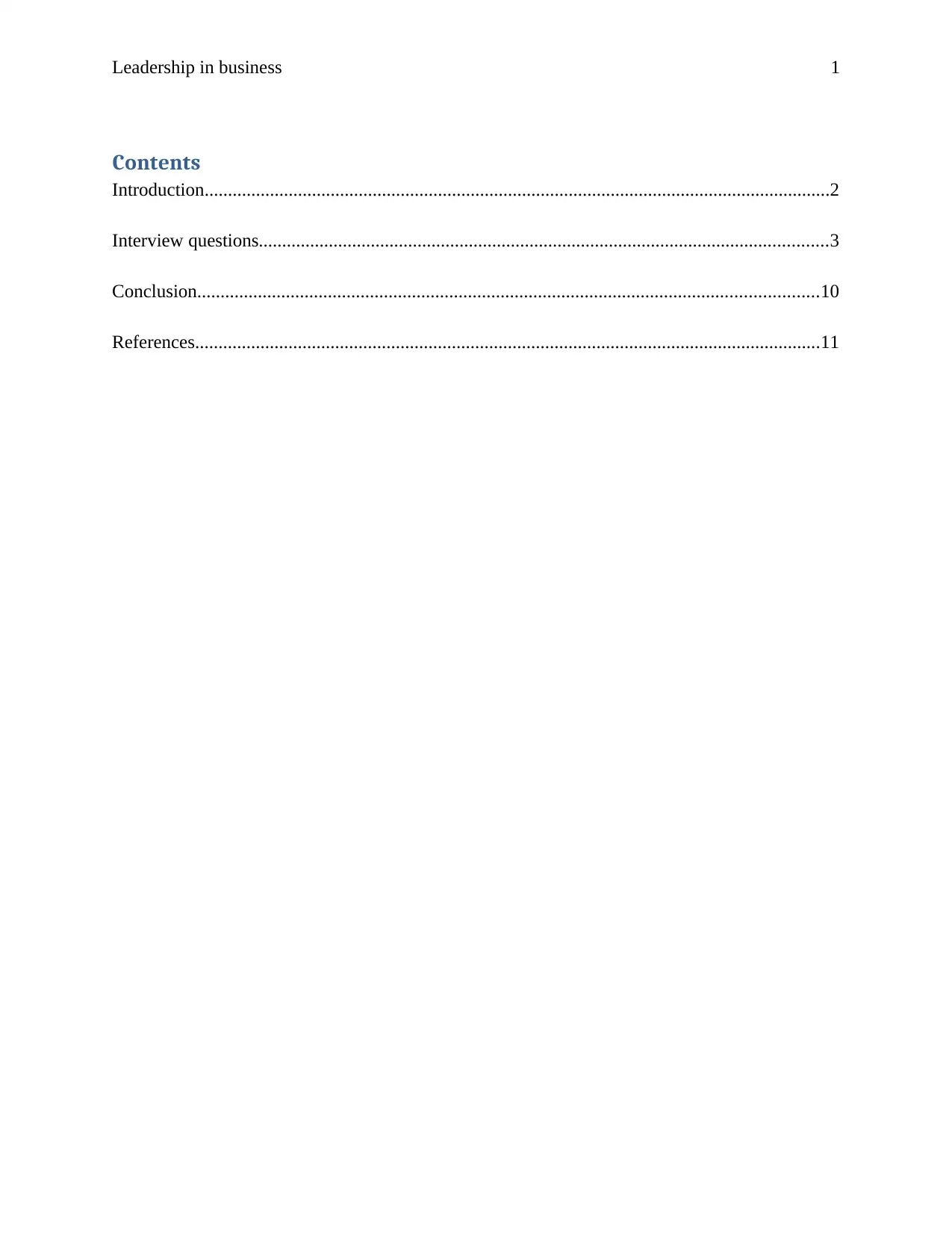
Leadership in business 1
Contents
Introduction......................................................................................................................................2
Interview questions..........................................................................................................................3
Conclusion.....................................................................................................................................10
References......................................................................................................................................11
Contents
Introduction......................................................................................................................................2
Interview questions..........................................................................................................................3
Conclusion.....................................................................................................................................10
References......................................................................................................................................11
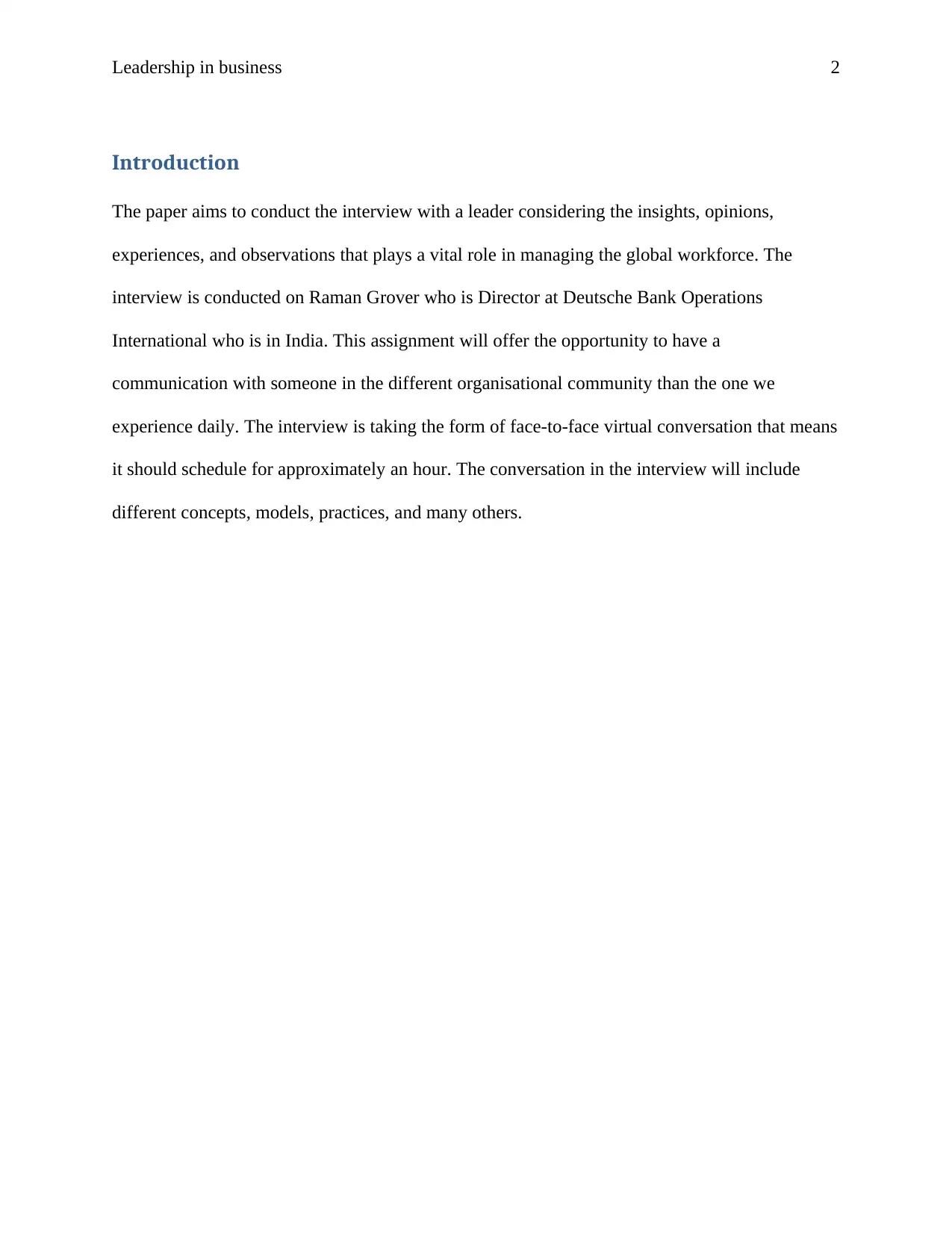
Leadership in business 2
Introduction
The paper aims to conduct the interview with a leader considering the insights, opinions,
experiences, and observations that plays a vital role in managing the global workforce. The
interview is conducted on Raman Grover who is Director at Deutsche Bank Operations
International who is in India. This assignment will offer the opportunity to have a
communication with someone in the different organisational community than the one we
experience daily. The interview is taking the form of face-to-face virtual conversation that means
it should schedule for approximately an hour. The conversation in the interview will include
different concepts, models, practices, and many others.
Introduction
The paper aims to conduct the interview with a leader considering the insights, opinions,
experiences, and observations that plays a vital role in managing the global workforce. The
interview is conducted on Raman Grover who is Director at Deutsche Bank Operations
International who is in India. This assignment will offer the opportunity to have a
communication with someone in the different organisational community than the one we
experience daily. The interview is taking the form of face-to-face virtual conversation that means
it should schedule for approximately an hour. The conversation in the interview will include
different concepts, models, practices, and many others.
⊘ This is a preview!⊘
Do you want full access?
Subscribe today to unlock all pages.

Trusted by 1+ million students worldwide
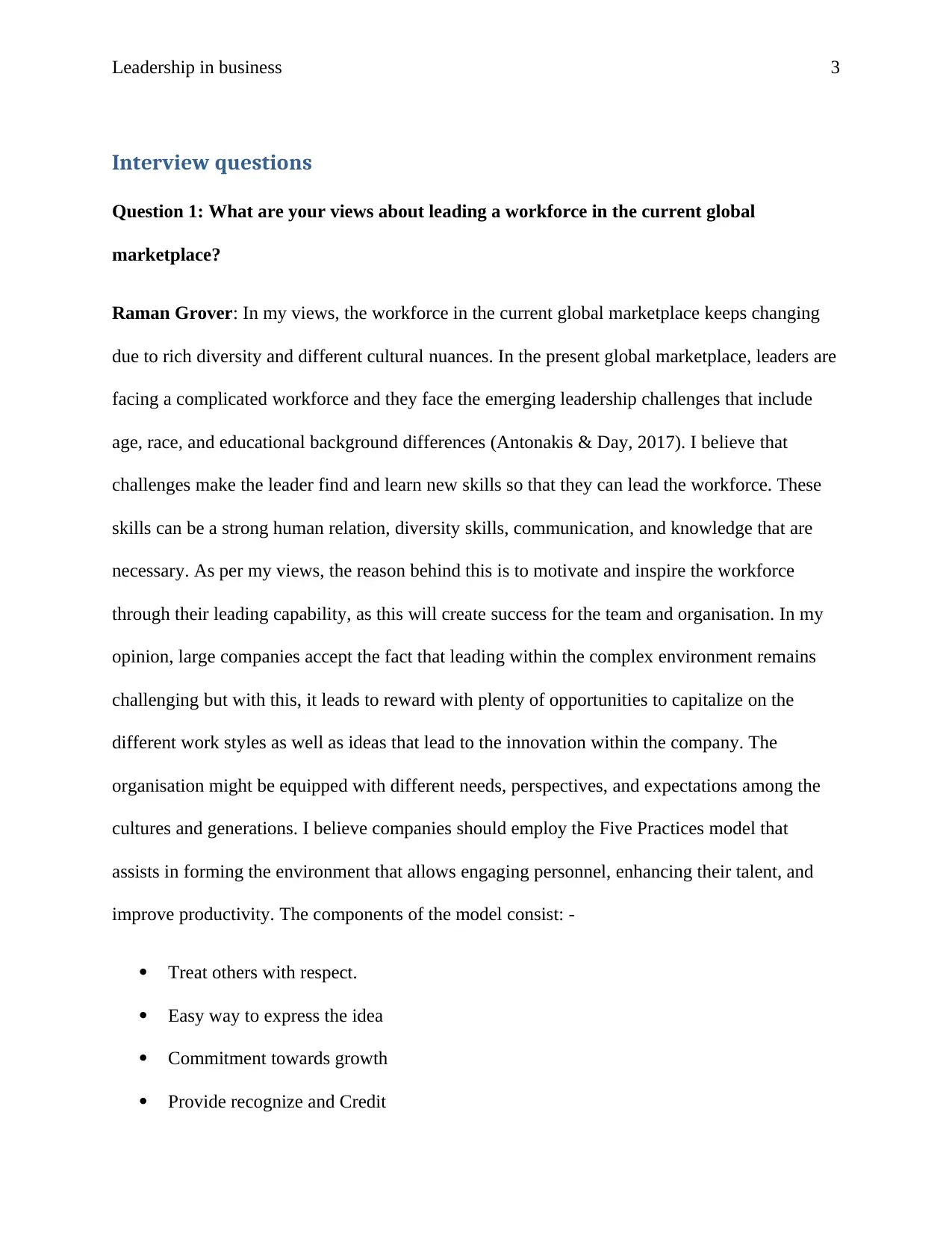
Leadership in business 3
Interview questions
Question 1: What are your views about leading a workforce in the current global
marketplace?
Raman Grover: In my views, the workforce in the current global marketplace keeps changing
due to rich diversity and different cultural nuances. In the present global marketplace, leaders are
facing a complicated workforce and they face the emerging leadership challenges that include
age, race, and educational background differences (Antonakis & Day, 2017). I believe that
challenges make the leader find and learn new skills so that they can lead the workforce. These
skills can be a strong human relation, diversity skills, communication, and knowledge that are
necessary. As per my views, the reason behind this is to motivate and inspire the workforce
through their leading capability, as this will create success for the team and organisation. In my
opinion, large companies accept the fact that leading within the complex environment remains
challenging but with this, it leads to reward with plenty of opportunities to capitalize on the
different work styles as well as ideas that lead to the innovation within the company. The
organisation might be equipped with different needs, perspectives, and expectations among the
cultures and generations. I believe companies should employ the Five Practices model that
assists in forming the environment that allows engaging personnel, enhancing their talent, and
improve productivity. The components of the model consist: -
Treat others with respect.
Easy way to express the idea
Commitment towards growth
Provide recognize and Credit
Interview questions
Question 1: What are your views about leading a workforce in the current global
marketplace?
Raman Grover: In my views, the workforce in the current global marketplace keeps changing
due to rich diversity and different cultural nuances. In the present global marketplace, leaders are
facing a complicated workforce and they face the emerging leadership challenges that include
age, race, and educational background differences (Antonakis & Day, 2017). I believe that
challenges make the leader find and learn new skills so that they can lead the workforce. These
skills can be a strong human relation, diversity skills, communication, and knowledge that are
necessary. As per my views, the reason behind this is to motivate and inspire the workforce
through their leading capability, as this will create success for the team and organisation. In my
opinion, large companies accept the fact that leading within the complex environment remains
challenging but with this, it leads to reward with plenty of opportunities to capitalize on the
different work styles as well as ideas that lead to the innovation within the company. The
organisation might be equipped with different needs, perspectives, and expectations among the
cultures and generations. I believe companies should employ the Five Practices model that
assists in forming the environment that allows engaging personnel, enhancing their talent, and
improve productivity. The components of the model consist: -
Treat others with respect.
Easy way to express the idea
Commitment towards growth
Provide recognize and Credit
Paraphrase This Document
Need a fresh take? Get an instant paraphrase of this document with our AI Paraphraser
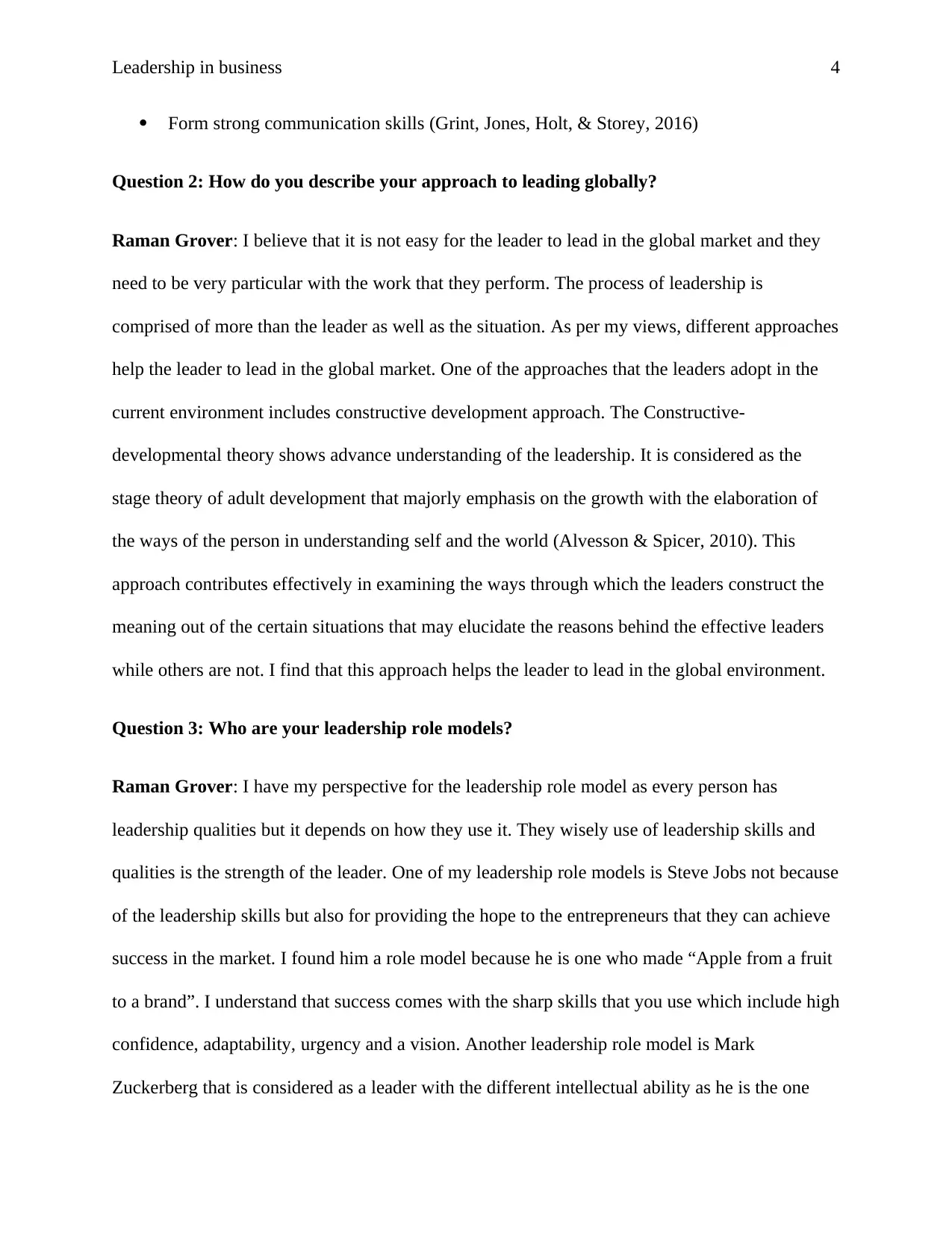
Leadership in business 4
Form strong communication skills (Grint, Jones, Holt, & Storey, 2016)
Question 2: How do you describe your approach to leading globally?
Raman Grover: I believe that it is not easy for the leader to lead in the global market and they
need to be very particular with the work that they perform. The process of leadership is
comprised of more than the leader as well as the situation. As per my views, different approaches
help the leader to lead in the global market. One of the approaches that the leaders adopt in the
current environment includes constructive development approach. The Constructive-
developmental theory shows advance understanding of the leadership. It is considered as the
stage theory of adult development that majorly emphasis on the growth with the elaboration of
the ways of the person in understanding self and the world (Alvesson & Spicer, 2010). This
approach contributes effectively in examining the ways through which the leaders construct the
meaning out of the certain situations that may elucidate the reasons behind the effective leaders
while others are not. I find that this approach helps the leader to lead in the global environment.
Question 3: Who are your leadership role models?
Raman Grover: I have my perspective for the leadership role model as every person has
leadership qualities but it depends on how they use it. They wisely use of leadership skills and
qualities is the strength of the leader. One of my leadership role models is Steve Jobs not because
of the leadership skills but also for providing the hope to the entrepreneurs that they can achieve
success in the market. I found him a role model because he is one who made “Apple from a fruit
to a brand”. I understand that success comes with the sharp skills that you use which include high
confidence, adaptability, urgency and a vision. Another leadership role model is Mark
Zuckerberg that is considered as a leader with the different intellectual ability as he is the one
Form strong communication skills (Grint, Jones, Holt, & Storey, 2016)
Question 2: How do you describe your approach to leading globally?
Raman Grover: I believe that it is not easy for the leader to lead in the global market and they
need to be very particular with the work that they perform. The process of leadership is
comprised of more than the leader as well as the situation. As per my views, different approaches
help the leader to lead in the global market. One of the approaches that the leaders adopt in the
current environment includes constructive development approach. The Constructive-
developmental theory shows advance understanding of the leadership. It is considered as the
stage theory of adult development that majorly emphasis on the growth with the elaboration of
the ways of the person in understanding self and the world (Alvesson & Spicer, 2010). This
approach contributes effectively in examining the ways through which the leaders construct the
meaning out of the certain situations that may elucidate the reasons behind the effective leaders
while others are not. I find that this approach helps the leader to lead in the global environment.
Question 3: Who are your leadership role models?
Raman Grover: I have my perspective for the leadership role model as every person has
leadership qualities but it depends on how they use it. They wisely use of leadership skills and
qualities is the strength of the leader. One of my leadership role models is Steve Jobs not because
of the leadership skills but also for providing the hope to the entrepreneurs that they can achieve
success in the market. I found him a role model because he is one who made “Apple from a fruit
to a brand”. I understand that success comes with the sharp skills that you use which include high
confidence, adaptability, urgency and a vision. Another leadership role model is Mark
Zuckerberg that is considered as a leader with the different intellectual ability as he is the one
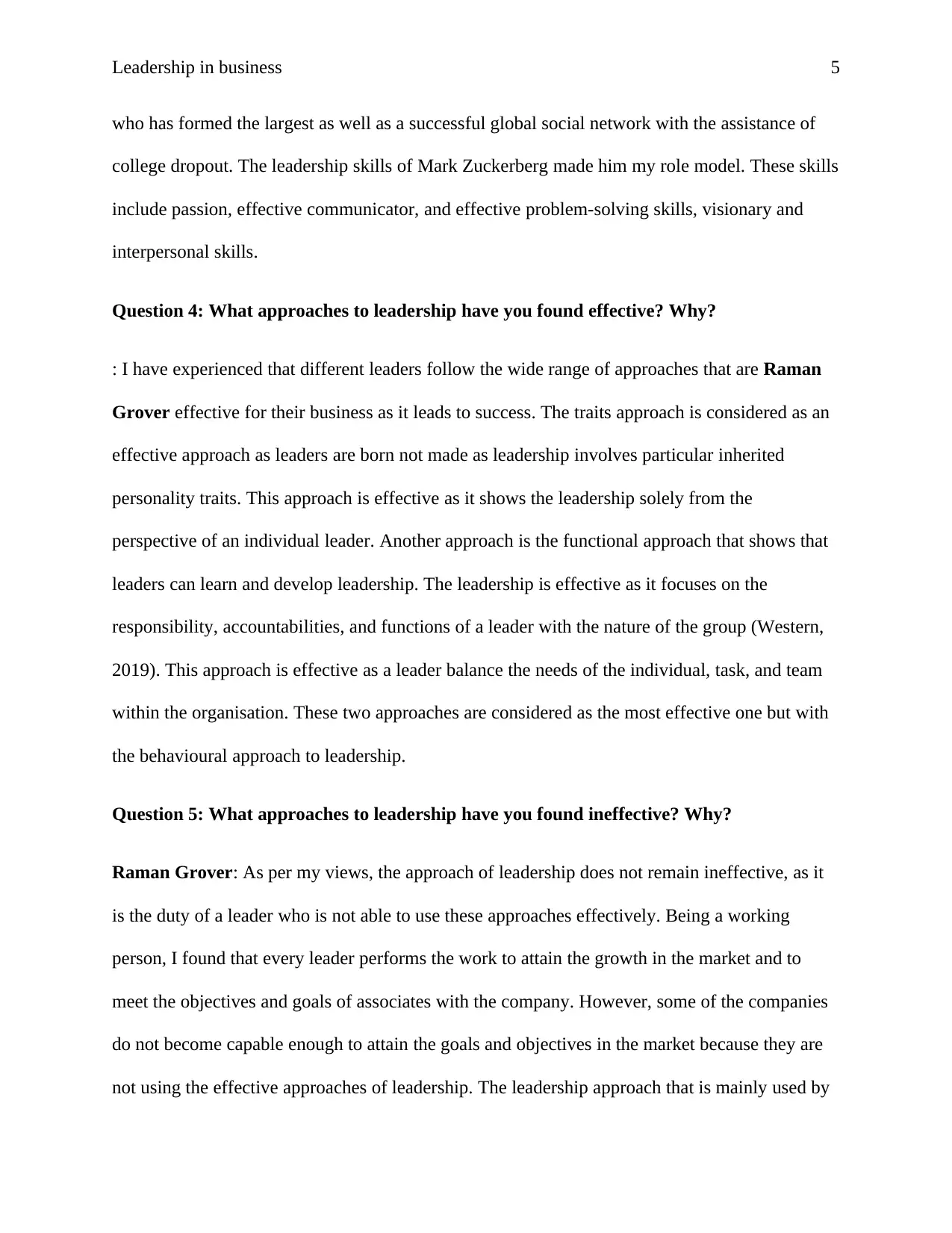
Leadership in business 5
who has formed the largest as well as a successful global social network with the assistance of
college dropout. The leadership skills of Mark Zuckerberg made him my role model. These skills
include passion, effective communicator, and effective problem-solving skills, visionary and
interpersonal skills.
Question 4: What approaches to leadership have you found effective? Why?
: I have experienced that different leaders follow the wide range of approaches that are Raman
Grover effective for their business as it leads to success. The traits approach is considered as an
effective approach as leaders are born not made as leadership involves particular inherited
personality traits. This approach is effective as it shows the leadership solely from the
perspective of an individual leader. Another approach is the functional approach that shows that
leaders can learn and develop leadership. The leadership is effective as it focuses on the
responsibility, accountabilities, and functions of a leader with the nature of the group (Western,
2019). This approach is effective as a leader balance the needs of the individual, task, and team
within the organisation. These two approaches are considered as the most effective one but with
the behavioural approach to leadership.
Question 5: What approaches to leadership have you found ineffective? Why?
Raman Grover: As per my views, the approach of leadership does not remain ineffective, as it
is the duty of a leader who is not able to use these approaches effectively. Being a working
person, I found that every leader performs the work to attain the growth in the market and to
meet the objectives and goals of associates with the company. However, some of the companies
do not become capable enough to attain the goals and objectives in the market because they are
not using the effective approaches of leadership. The leadership approach that is mainly used by
who has formed the largest as well as a successful global social network with the assistance of
college dropout. The leadership skills of Mark Zuckerberg made him my role model. These skills
include passion, effective communicator, and effective problem-solving skills, visionary and
interpersonal skills.
Question 4: What approaches to leadership have you found effective? Why?
: I have experienced that different leaders follow the wide range of approaches that are Raman
Grover effective for their business as it leads to success. The traits approach is considered as an
effective approach as leaders are born not made as leadership involves particular inherited
personality traits. This approach is effective as it shows the leadership solely from the
perspective of an individual leader. Another approach is the functional approach that shows that
leaders can learn and develop leadership. The leadership is effective as it focuses on the
responsibility, accountabilities, and functions of a leader with the nature of the group (Western,
2019). This approach is effective as a leader balance the needs of the individual, task, and team
within the organisation. These two approaches are considered as the most effective one but with
the behavioural approach to leadership.
Question 5: What approaches to leadership have you found ineffective? Why?
Raman Grover: As per my views, the approach of leadership does not remain ineffective, as it
is the duty of a leader who is not able to use these approaches effectively. Being a working
person, I found that every leader performs the work to attain the growth in the market and to
meet the objectives and goals of associates with the company. However, some of the companies
do not become capable enough to attain the goals and objectives in the market because they are
not using the effective approaches of leadership. The leadership approach that is mainly used by
⊘ This is a preview!⊘
Do you want full access?
Subscribe today to unlock all pages.

Trusted by 1+ million students worldwide
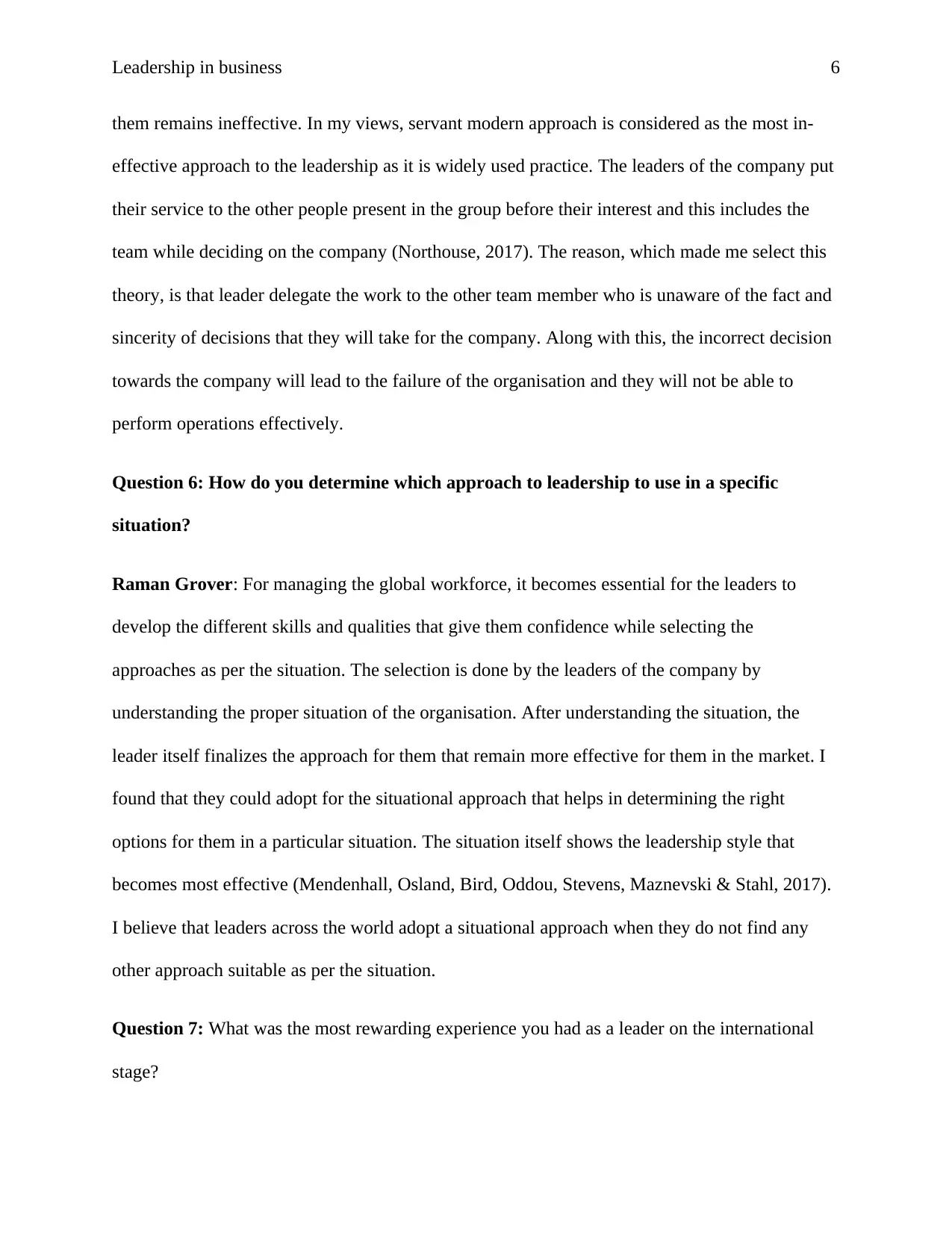
Leadership in business 6
them remains ineffective. In my views, servant modern approach is considered as the most in-
effective approach to the leadership as it is widely used practice. The leaders of the company put
their service to the other people present in the group before their interest and this includes the
team while deciding on the company (Northouse, 2017). The reason, which made me select this
theory, is that leader delegate the work to the other team member who is unaware of the fact and
sincerity of decisions that they will take for the company. Along with this, the incorrect decision
towards the company will lead to the failure of the organisation and they will not be able to
perform operations effectively.
Question 6: How do you determine which approach to leadership to use in a specific
situation?
Raman Grover: For managing the global workforce, it becomes essential for the leaders to
develop the different skills and qualities that give them confidence while selecting the
approaches as per the situation. The selection is done by the leaders of the company by
understanding the proper situation of the organisation. After understanding the situation, the
leader itself finalizes the approach for them that remain more effective for them in the market. I
found that they could adopt for the situational approach that helps in determining the right
options for them in a particular situation. The situation itself shows the leadership style that
becomes most effective (Mendenhall, Osland, Bird, Oddou, Stevens, Maznevski & Stahl, 2017).
I believe that leaders across the world adopt a situational approach when they do not find any
other approach suitable as per the situation.
Question 7: What was the most rewarding experience you had as a leader on the international
stage?
them remains ineffective. In my views, servant modern approach is considered as the most in-
effective approach to the leadership as it is widely used practice. The leaders of the company put
their service to the other people present in the group before their interest and this includes the
team while deciding on the company (Northouse, 2017). The reason, which made me select this
theory, is that leader delegate the work to the other team member who is unaware of the fact and
sincerity of decisions that they will take for the company. Along with this, the incorrect decision
towards the company will lead to the failure of the organisation and they will not be able to
perform operations effectively.
Question 6: How do you determine which approach to leadership to use in a specific
situation?
Raman Grover: For managing the global workforce, it becomes essential for the leaders to
develop the different skills and qualities that give them confidence while selecting the
approaches as per the situation. The selection is done by the leaders of the company by
understanding the proper situation of the organisation. After understanding the situation, the
leader itself finalizes the approach for them that remain more effective for them in the market. I
found that they could adopt for the situational approach that helps in determining the right
options for them in a particular situation. The situation itself shows the leadership style that
becomes most effective (Mendenhall, Osland, Bird, Oddou, Stevens, Maznevski & Stahl, 2017).
I believe that leaders across the world adopt a situational approach when they do not find any
other approach suitable as per the situation.
Question 7: What was the most rewarding experience you had as a leader on the international
stage?
Paraphrase This Document
Need a fresh take? Get an instant paraphrase of this document with our AI Paraphraser
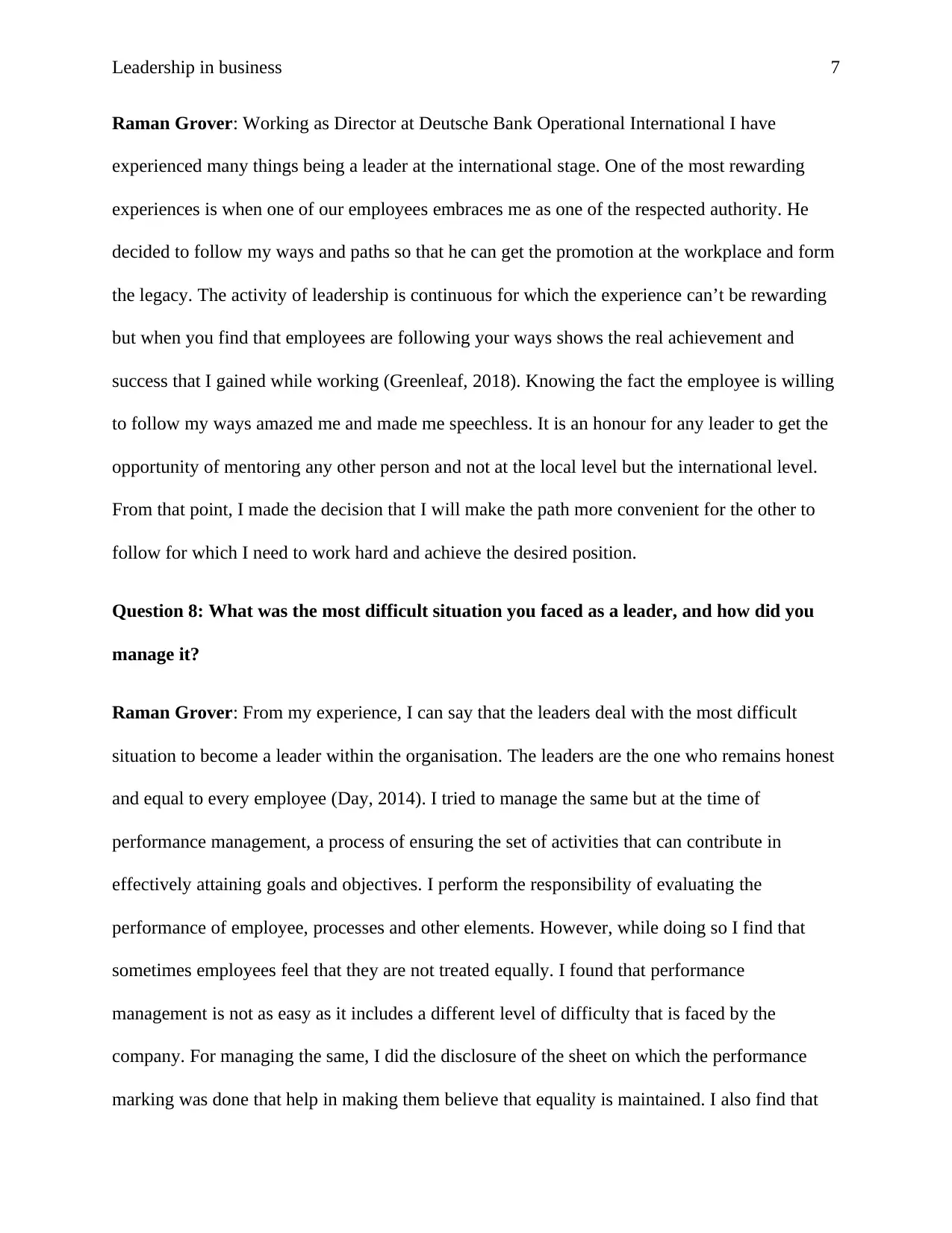
Leadership in business 7
Raman Grover: Working as Director at Deutsche Bank Operational International I have
experienced many things being a leader at the international stage. One of the most rewarding
experiences is when one of our employees embraces me as one of the respected authority. He
decided to follow my ways and paths so that he can get the promotion at the workplace and form
the legacy. The activity of leadership is continuous for which the experience can’t be rewarding
but when you find that employees are following your ways shows the real achievement and
success that I gained while working (Greenleaf, 2018). Knowing the fact the employee is willing
to follow my ways amazed me and made me speechless. It is an honour for any leader to get the
opportunity of mentoring any other person and not at the local level but the international level.
From that point, I made the decision that I will make the path more convenient for the other to
follow for which I need to work hard and achieve the desired position.
Question 8: What was the most difficult situation you faced as a leader, and how did you
manage it?
Raman Grover: From my experience, I can say that the leaders deal with the most difficult
situation to become a leader within the organisation. The leaders are the one who remains honest
and equal to every employee (Day, 2014). I tried to manage the same but at the time of
performance management, a process of ensuring the set of activities that can contribute in
effectively attaining goals and objectives. I perform the responsibility of evaluating the
performance of employee, processes and other elements. However, while doing so I find that
sometimes employees feel that they are not treated equally. I found that performance
management is not as easy as it includes a different level of difficulty that is faced by the
company. For managing the same, I did the disclosure of the sheet on which the performance
marking was done that help in making them believe that equality is maintained. I also find that
Raman Grover: Working as Director at Deutsche Bank Operational International I have
experienced many things being a leader at the international stage. One of the most rewarding
experiences is when one of our employees embraces me as one of the respected authority. He
decided to follow my ways and paths so that he can get the promotion at the workplace and form
the legacy. The activity of leadership is continuous for which the experience can’t be rewarding
but when you find that employees are following your ways shows the real achievement and
success that I gained while working (Greenleaf, 2018). Knowing the fact the employee is willing
to follow my ways amazed me and made me speechless. It is an honour for any leader to get the
opportunity of mentoring any other person and not at the local level but the international level.
From that point, I made the decision that I will make the path more convenient for the other to
follow for which I need to work hard and achieve the desired position.
Question 8: What was the most difficult situation you faced as a leader, and how did you
manage it?
Raman Grover: From my experience, I can say that the leaders deal with the most difficult
situation to become a leader within the organisation. The leaders are the one who remains honest
and equal to every employee (Day, 2014). I tried to manage the same but at the time of
performance management, a process of ensuring the set of activities that can contribute in
effectively attaining goals and objectives. I perform the responsibility of evaluating the
performance of employee, processes and other elements. However, while doing so I find that
sometimes employees feel that they are not treated equally. I found that performance
management is not as easy as it includes a different level of difficulty that is faced by the
company. For managing the same, I did the disclosure of the sheet on which the performance
marking was done that help in making them believe that equality is maintained. I also find that
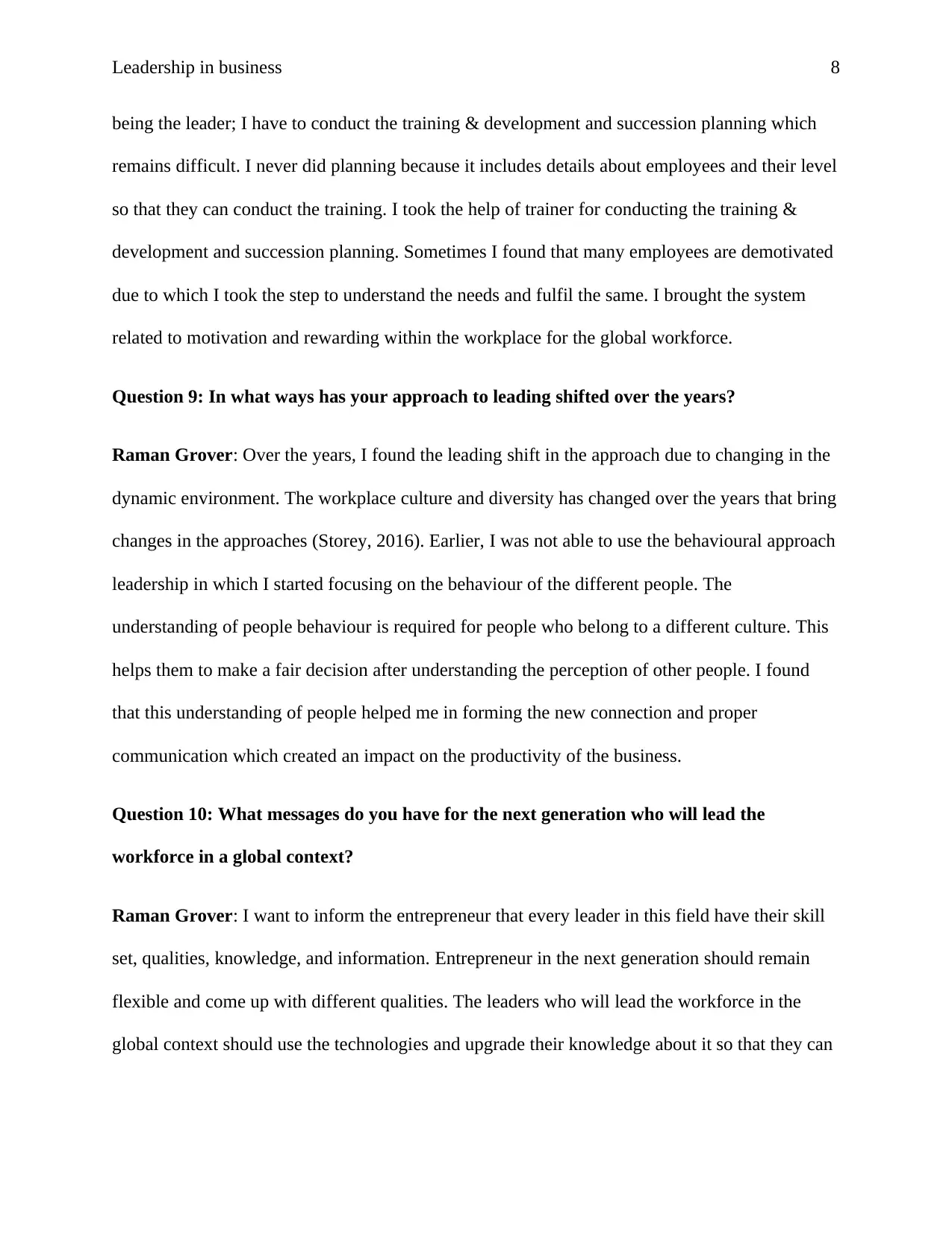
Leadership in business 8
being the leader; I have to conduct the training & development and succession planning which
remains difficult. I never did planning because it includes details about employees and their level
so that they can conduct the training. I took the help of trainer for conducting the training &
development and succession planning. Sometimes I found that many employees are demotivated
due to which I took the step to understand the needs and fulfil the same. I brought the system
related to motivation and rewarding within the workplace for the global workforce.
Question 9: In what ways has your approach to leading shifted over the years?
Raman Grover: Over the years, I found the leading shift in the approach due to changing in the
dynamic environment. The workplace culture and diversity has changed over the years that bring
changes in the approaches (Storey, 2016). Earlier, I was not able to use the behavioural approach
leadership in which I started focusing on the behaviour of the different people. The
understanding of people behaviour is required for people who belong to a different culture. This
helps them to make a fair decision after understanding the perception of other people. I found
that this understanding of people helped me in forming the new connection and proper
communication which created an impact on the productivity of the business.
Question 10: What messages do you have for the next generation who will lead the
workforce in a global context?
Raman Grover: I want to inform the entrepreneur that every leader in this field have their skill
set, qualities, knowledge, and information. Entrepreneur in the next generation should remain
flexible and come up with different qualities. The leaders who will lead the workforce in the
global context should use the technologies and upgrade their knowledge about it so that they can
being the leader; I have to conduct the training & development and succession planning which
remains difficult. I never did planning because it includes details about employees and their level
so that they can conduct the training. I took the help of trainer for conducting the training &
development and succession planning. Sometimes I found that many employees are demotivated
due to which I took the step to understand the needs and fulfil the same. I brought the system
related to motivation and rewarding within the workplace for the global workforce.
Question 9: In what ways has your approach to leading shifted over the years?
Raman Grover: Over the years, I found the leading shift in the approach due to changing in the
dynamic environment. The workplace culture and diversity has changed over the years that bring
changes in the approaches (Storey, 2016). Earlier, I was not able to use the behavioural approach
leadership in which I started focusing on the behaviour of the different people. The
understanding of people behaviour is required for people who belong to a different culture. This
helps them to make a fair decision after understanding the perception of other people. I found
that this understanding of people helped me in forming the new connection and proper
communication which created an impact on the productivity of the business.
Question 10: What messages do you have for the next generation who will lead the
workforce in a global context?
Raman Grover: I want to inform the entrepreneur that every leader in this field have their skill
set, qualities, knowledge, and information. Entrepreneur in the next generation should remain
flexible and come up with different qualities. The leaders who will lead the workforce in the
global context should use the technologies and upgrade their knowledge about it so that they can
⊘ This is a preview!⊘
Do you want full access?
Subscribe today to unlock all pages.

Trusted by 1+ million students worldwide
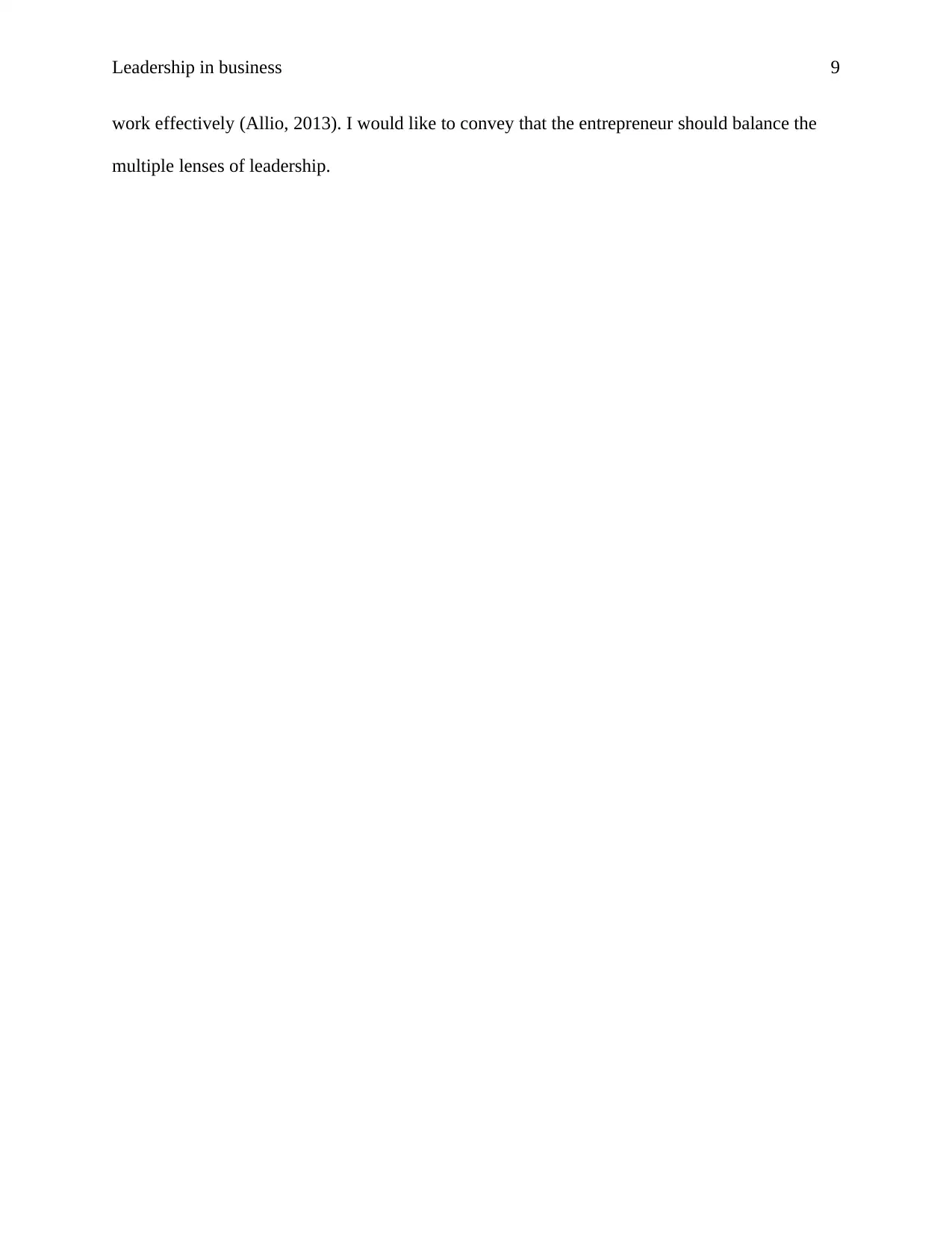
Leadership in business 9
work effectively (Allio, 2013). I would like to convey that the entrepreneur should balance the
multiple lenses of leadership.
work effectively (Allio, 2013). I would like to convey that the entrepreneur should balance the
multiple lenses of leadership.
Paraphrase This Document
Need a fresh take? Get an instant paraphrase of this document with our AI Paraphraser
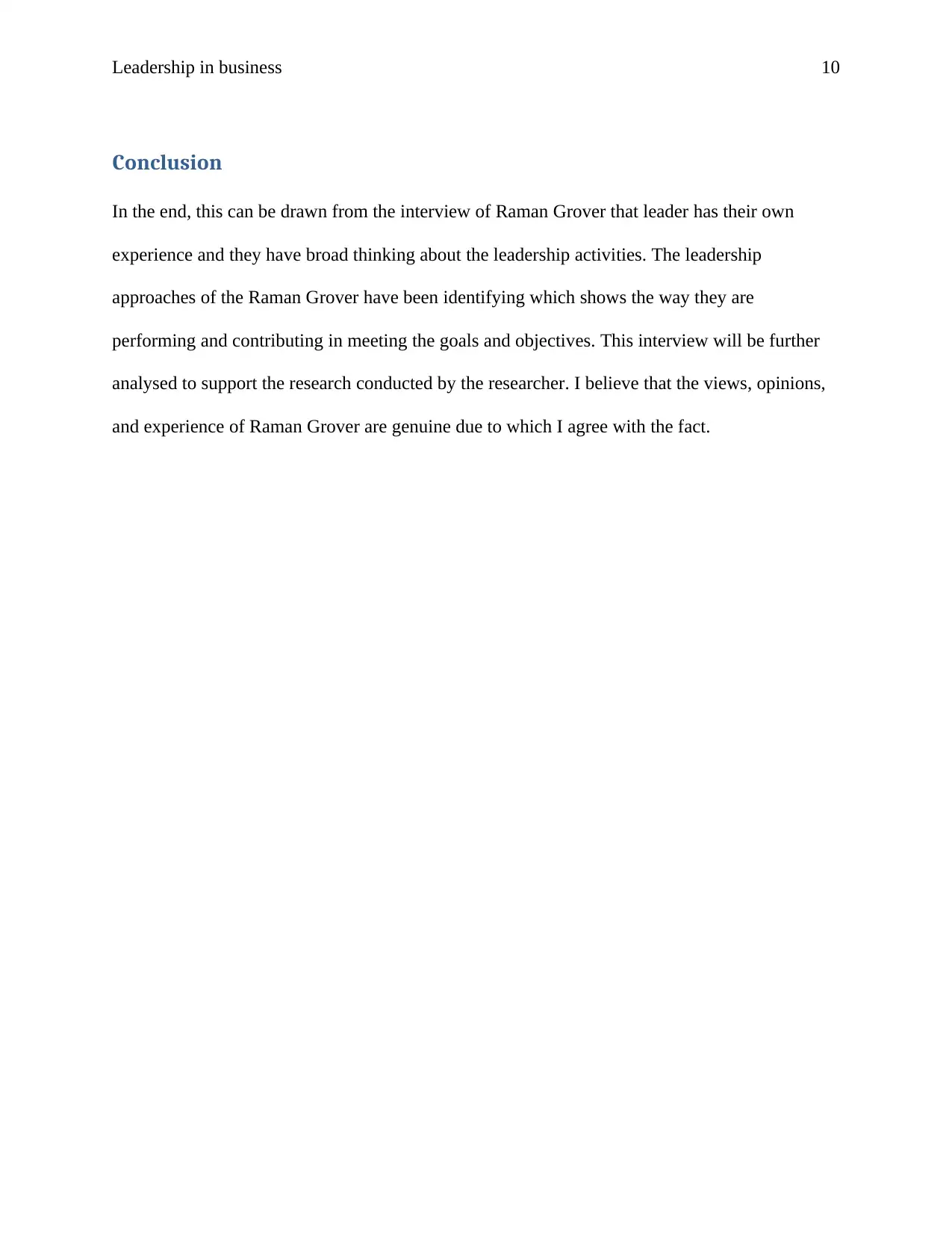
Leadership in business 10
Conclusion
In the end, this can be drawn from the interview of Raman Grover that leader has their own
experience and they have broad thinking about the leadership activities. The leadership
approaches of the Raman Grover have been identifying which shows the way they are
performing and contributing in meeting the goals and objectives. This interview will be further
analysed to support the research conducted by the researcher. I believe that the views, opinions,
and experience of Raman Grover are genuine due to which I agree with the fact.
Conclusion
In the end, this can be drawn from the interview of Raman Grover that leader has their own
experience and they have broad thinking about the leadership activities. The leadership
approaches of the Raman Grover have been identifying which shows the way they are
performing and contributing in meeting the goals and objectives. This interview will be further
analysed to support the research conducted by the researcher. I believe that the views, opinions,
and experience of Raman Grover are genuine due to which I agree with the fact.
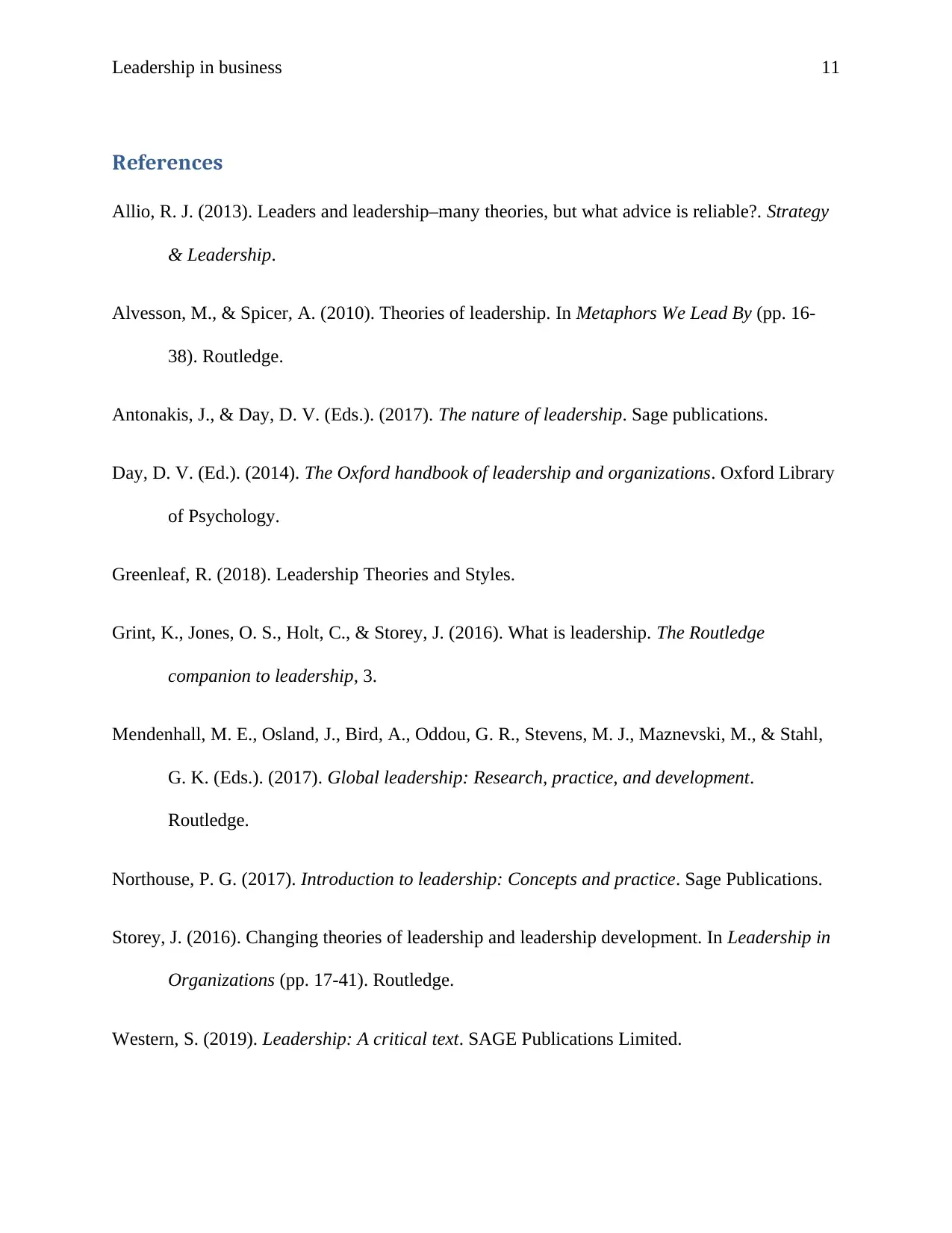
Leadership in business 11
References
Allio, R. J. (2013). Leaders and leadership–many theories, but what advice is reliable?. Strategy
& Leadership.
Alvesson, M., & Spicer, A. (2010). Theories of leadership. In Metaphors We Lead By (pp. 16-
38). Routledge.
Antonakis, J., & Day, D. V. (Eds.). (2017). The nature of leadership. Sage publications.
Day, D. V. (Ed.). (2014). The Oxford handbook of leadership and organizations. Oxford Library
of Psychology.
Greenleaf, R. (2018). Leadership Theories and Styles.
Grint, K., Jones, O. S., Holt, C., & Storey, J. (2016). What is leadership. The Routledge
companion to leadership, 3.
Mendenhall, M. E., Osland, J., Bird, A., Oddou, G. R., Stevens, M. J., Maznevski, M., & Stahl,
G. K. (Eds.). (2017). Global leadership: Research, practice, and development.
Routledge.
Northouse, P. G. (2017). Introduction to leadership: Concepts and practice. Sage Publications.
Storey, J. (2016). Changing theories of leadership and leadership development. In Leadership in
Organizations (pp. 17-41). Routledge.
Western, S. (2019). Leadership: A critical text. SAGE Publications Limited.
References
Allio, R. J. (2013). Leaders and leadership–many theories, but what advice is reliable?. Strategy
& Leadership.
Alvesson, M., & Spicer, A. (2010). Theories of leadership. In Metaphors We Lead By (pp. 16-
38). Routledge.
Antonakis, J., & Day, D. V. (Eds.). (2017). The nature of leadership. Sage publications.
Day, D. V. (Ed.). (2014). The Oxford handbook of leadership and organizations. Oxford Library
of Psychology.
Greenleaf, R. (2018). Leadership Theories and Styles.
Grint, K., Jones, O. S., Holt, C., & Storey, J. (2016). What is leadership. The Routledge
companion to leadership, 3.
Mendenhall, M. E., Osland, J., Bird, A., Oddou, G. R., Stevens, M. J., Maznevski, M., & Stahl,
G. K. (Eds.). (2017). Global leadership: Research, practice, and development.
Routledge.
Northouse, P. G. (2017). Introduction to leadership: Concepts and practice. Sage Publications.
Storey, J. (2016). Changing theories of leadership and leadership development. In Leadership in
Organizations (pp. 17-41). Routledge.
Western, S. (2019). Leadership: A critical text. SAGE Publications Limited.
⊘ This is a preview!⊘
Do you want full access?
Subscribe today to unlock all pages.

Trusted by 1+ million students worldwide
1 out of 12
Related Documents
Your All-in-One AI-Powered Toolkit for Academic Success.
+13062052269
info@desklib.com
Available 24*7 on WhatsApp / Email
![[object Object]](/_next/static/media/star-bottom.7253800d.svg)
Unlock your academic potential
Copyright © 2020–2026 A2Z Services. All Rights Reserved. Developed and managed by ZUCOL.



